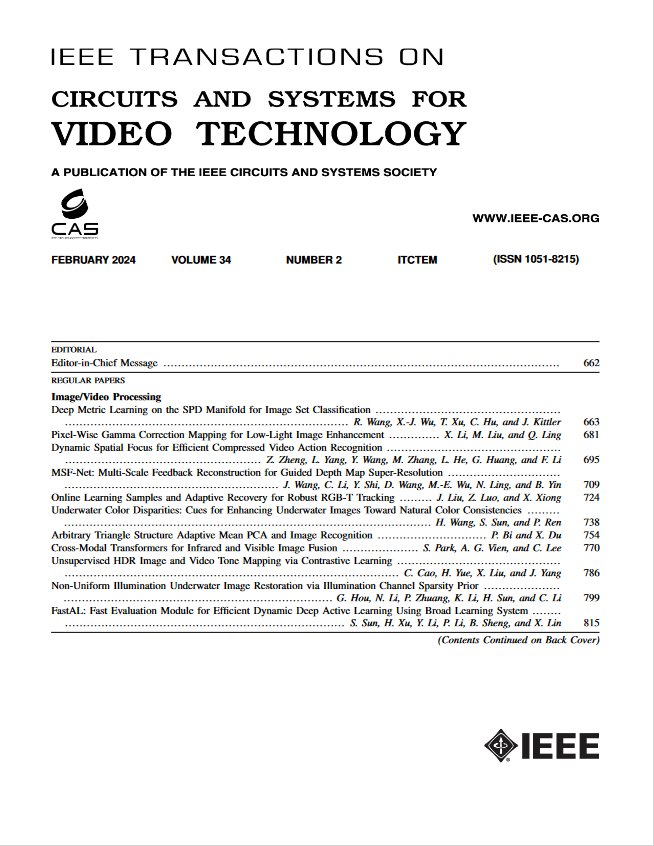Dual Teacher Knowledge Distillation With Domain Alignment for Face Anti-Spoofing
IF 8.3
1区 工程技术
Q1 ENGINEERING, ELECTRICAL & ELECTRONIC
IEEE Transactions on Circuits and Systems for Video Technology
Pub Date : 2024-08-28
DOI:10.1109/TCSVT.2024.3451294
引用次数: 0
Abstract
Face recognition systems have raised concerns due to their vulnerability to different presentation attacks, and system security has become an increasingly critical concern. Although many face anti-spoofing (FAS) methods perform well in intra-dataset scenarios, their generalization remains a challenge. To address this issue, some methods adopt domain adversarial training (DAT) to extract domain-invariant features. Differently, in this paper, we propose a domain adversarial attack (DAA) method by adding perturbations to the input images, which makes them indistinguishable across domains and enables domain alignment. Moreover, since models trained on limited data and types of attacks cannot generalize well to unknown attacks, we propose a dual perceptual and generative knowledge distillation framework for face anti-spoofing that utilizes pre-trained face-related models containing rich face priors. Specifically, we adopt two different face-related models as teachers to transfer knowledge to the target student model. The pre-trained teacher models are not from the task of face anti-spoofing but from perceptual and generative tasks, respectively, which implicitly augment the data. By combining both DAA and dual-teacher knowledge distillation, we develop a dual teacher knowledge distillation with domain alignment framework (DTDA) for face anti-spoofing. The advantage of our proposed method has been verified through extensive ablation studies and comparison with state-of-the-art methods on public datasets across multiple protocols.针对人脸防欺骗的双师知识提炼与领域对齐
人脸识别系统由于易受不同表现形式的攻击而引起人们的关注,系统安全性已成为越来越重要的问题。尽管许多反欺骗(FAS)方法在数据集内场景中表现良好,但它们的泛化仍然是一个挑战。为了解决这一问题,一些方法采用领域对抗训练(DAT)来提取领域不变特征。不同的是,在本文中,我们提出了一种域对抗攻击(DAA)方法,通过在输入图像中添加扰动,使它们跨域不可区分并实现域对齐。此外,由于在有限数据和攻击类型上训练的模型不能很好地推广到未知攻击,我们提出了一种双重感知和生成知识蒸馏框架,用于人脸反欺骗,该框架利用包含丰富人脸先验的预训练人脸相关模型。具体而言,我们采用两种不同的面孔相关模型作为教师向目标学生模型传递知识。预训练的教师模型不是来自面部反欺骗任务,而是分别来自感知和生成任务,它们隐式地增强了数据。将DAA和双教师知识蒸馏相结合,提出了一种基于领域对齐框架的双教师知识蒸馏人脸防欺骗方法。我们提出的方法的优势已经通过广泛的消融研究和与跨多个协议的公共数据集的最先进方法的比较得到验证。
本文章由计算机程序翻译,如有差异,请以英文原文为准。
求助全文
约1分钟内获得全文
求助全文
来源期刊
CiteScore
13.80
自引率
27.40%
发文量
660
审稿时长
5 months
期刊介绍:
The IEEE Transactions on Circuits and Systems for Video Technology (TCSVT) is dedicated to covering all aspects of video technologies from a circuits and systems perspective. We encourage submissions of general, theoretical, and application-oriented papers related to image and video acquisition, representation, presentation, and display. Additionally, we welcome contributions in areas such as processing, filtering, and transforms; analysis and synthesis; learning and understanding; compression, transmission, communication, and networking; as well as storage, retrieval, indexing, and search. Furthermore, papers focusing on hardware and software design and implementation are highly valued. Join us in advancing the field of video technology through innovative research and insights.

 求助内容:
求助内容: 应助结果提醒方式:
应助结果提醒方式:


